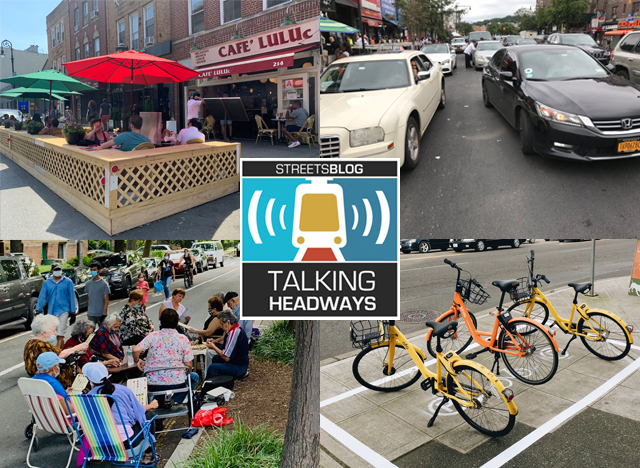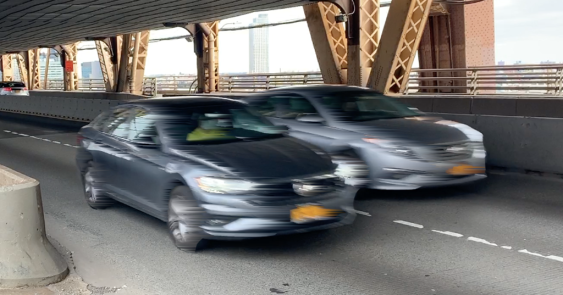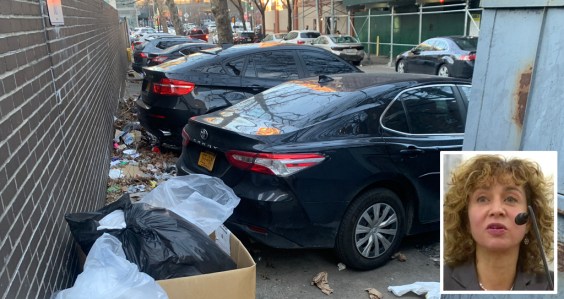This week, we’re again joined by Shared Use Mobility Center Founder-in-Residence Sharon Feigon, who talks with us about what she hopes the focus will be for the new administration, how shared mobility has fared during the pandemic, and her plans for the future.
If you prefer to read the highlights, a partial transcript is below the audio player (a full transcript is here):
Jeff Wood: It's been really amazing to see how businesses have shifted their mindset from, "We need that single parking space in front of our building" to "We need that space for our diners and customers." So many places have taken parking spaces and made it into six, seven or eight stalls for people when usually it would have been one parked car for an hour. I think people can actually see what that shift means now and has actually opened some people's eyes. People don't want to go back to the way things were before.So that's a positive thing that's come out of this horrible situation.
Sharon Feigon: That's true. And even here in Chicago, where it's cold out, you see all these elaborate igloos and different tent structures taking up a lot of street space in all different neighborhoods — like right in the center of the street in some cases. They're certainly taking away parking that existed, but people are eager. So how that plays out going forward is going to be very interesting, but I think what we've learned is that it can be done and that you can use the street differently.
I read an article the other day about changing the relationship of the neighbors to the street and that people on a street could decide how they wanted to use their street and what sort of things should occur there and whether to allow parking, and I was like, "Wow." I remember when we were reading Donald Shoup and talking about this 20 years ago. And now its an idea that can take hold in some places and spread.
Jeff: Yeah It's more mainstream now. It's been interesting to see how stuff has changed so quickly too because you had the ride-hailing companies starting it off and you saw this shift to the discussion about scooters and personal mobility devices and that's continued. Now you have bike-sharing, too, and transit agencies like Capital Metro in Austin taking over the bike share and pulling it into their purview. And it's been interesting to see how fast these things rise and how fast they fall as well — companies come in and then disappear. I'm curious how you've been thinking about it. We used to talk about things in decades and now it's in quarters of a year.
Sharon Feigon: It's been remarkable the number of startups and different companies jumping into the spaces. When I got started, I knew the car-share world because I had been a car-share operator for 10 years and I knew everybody in car-sharing. And I don't think the work we did in carsharing was fully understood or appreciated. We were in the biggest cities. We were non-profits doing this and we were working with city agencies for parking spaces and other things, but it became a "new thing" somehow under Shared-Use Mobility Center with these new modes. There was a little bit of, "Oh yeah, we've done this before, we've done these agreements with cities." There wasn't the contention that occurred, well at least like the transportation network company and how they approached things.
We've also seen a lot of consolidation with these companies and it's so interesting. I think the dockless bike-share was really an example where you had this massive amount of bikes everywhere, then they were gone. That one happened really quickly. But, meanwhile, you had Uber and Lyft doing consolidation and becoming multimodal themselves and then taking it a step further to have the apps to integrate the modes. And of course, when you have a company doing that and they own parts of it and have investments in it, they are the only ones on their app.
So now you have the proliferation of all these different apps combining different players in the field and now we're starting to move towards a little more systematic definitions of what the modes are and we're also starting to figure out how to have some open structures so that you can have multiple participants. I mean we're not there yet, but there are elements of it. Somehow in this process the integration of the modes became known as MaaS [mobility as a service] and it was about the integration and also the fare payment, but now we're starting to see that grow.





